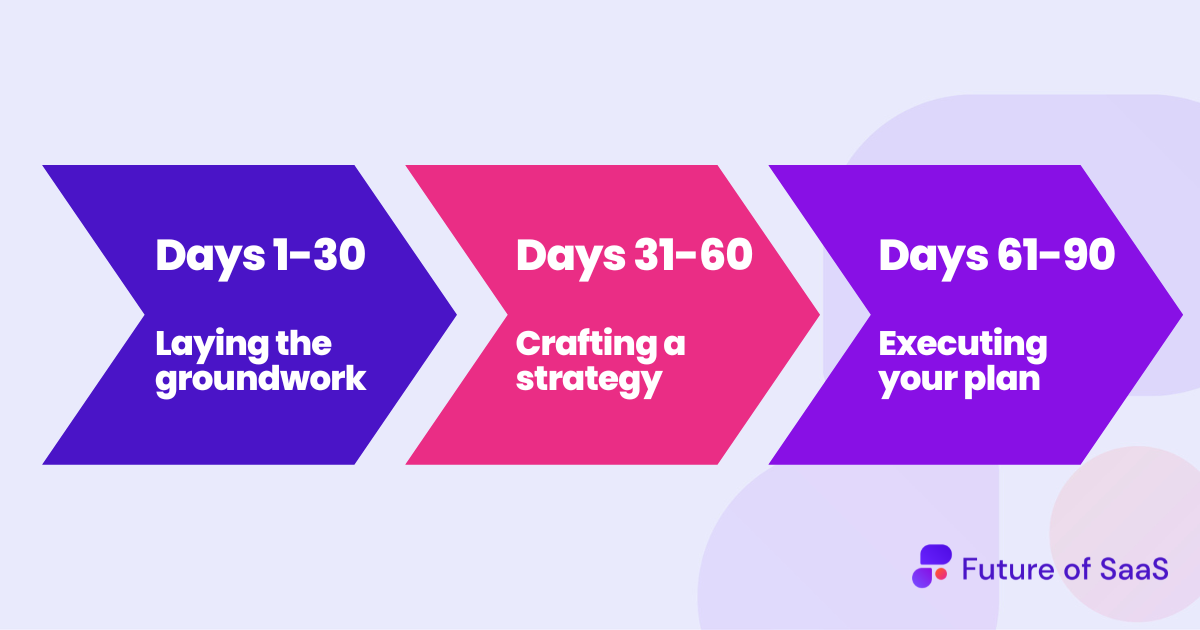Ever wondered what separates a good VP of Marketing from a great one?
It's not just about the strategies they bring to the table; it's about how quickly and effectively they can launch those strategies into motion.
Picture this: within the first 90 days, you have the power to lay down a roadmap to redefine your company's marketing landscape. Exciting, right?
Stepping into the role of VP of Marketing at a SaaS company is like being handed the keys to a powerful engine. The potential for impact is huge, but so is the responsibility.
In these first crucial days, you're not just making decisions; you're setting the tone for your tenure and, more importantly, for the future of your company's marketing success.
In this article, we'll walk you through a step-by-step plan for your first 90 days. From understanding the unique dynamics of your new company to laying down a strategy that resonates with your team and aligns with your CEO's vision, we've got you covered.
So, are you ready to make these first 90 days count and steer your team towards uncharted territories of success? Let's dive in!

Days 1-30: Laying the groundwork
Understanding company goals and the current state of marketing
Your first order of business is to get a comprehensive understanding of the company's overall goals and how the marketing department fits into this bigger picture.
This means diving deep into revenue objectives, customer base, product popularity, and growth patterns. It's essential to review all current marketing assets and tools at your disposal.
Are they aligned with your company's vision? How effective have they been in the past? This initial assessment will give you a clear picture of where you stand and where you need to go.
Establishing relationships with key stakeholders
Building strong relationships with key stakeholders, especially the CEO and CFO, is critical.
These early interactions are more than just meet-and-greets; they're fact-finding missions. Understand their vision for the company and the marketing department.
What are their top concerns? What do they expect in the coming year? Aligning your strategies with their goals is paramount for mutual success.
Reviewing marketing assets, tools, and performance metrics
Take a thorough look at the existing marketing assets and tools. How effective are the current content marketing, advertising, and email marketing plans?
Meeting with outside agency executives, if any, will also help you gauge the effectiveness of these strategies and the relationships in place.
Familiarize yourself with the technology platforms and tools your company uses, and ensure you have access to management KPI dashboards.
This will help you understand the metrics that matter most to your team and company.

Conducting competitor analysis and understanding market positioning
A comprehensive competitor analysis is vital. What are your competitors doing right? Where are they lacking?
Understanding their go-to-market strategies, positioning, and marketing mix will give you insights into market trends and potential opportunities for differentiation.
This is also the time to review customer success surveys for current and churned customers, giving you a clearer picture of your company's position in the market.
Actionable steps
📆 Schedule meetings with the CEO, CFO, and other key executives to align on goals and expectations.
🗂️ Conduct a thorough review of all marketing assets and tools.
🤝 Meet with team members and external agency executives to understand current strategies and relationships.
🧠 Dive into competitor research and market analysis.
💻 Start using the product(s) your company sells to understand customer experience.
In these first 30 days, your mission is to absorb as much information as possible, setting the stage for the strategic planning and execution that will follow.
It's about understanding the landscape, aligning with key players, and identifying the opportunities and challenges that will shape your strategy in the days to come.

Days 31-60: Crafting a cohesive marketing strategy
Reviewing and selecting automation tools
Now that you have a solid understanding of the company's goals and the current state of marketing, it's time to evaluate the tools at your disposal.
Are the existing marketing and sales automation tools adequate, or is there a need for new solutions?
This period involves researching potential tools, understanding their fit for your specific needs, and making informed decisions. Remember, the right tools can significantly enhance efficiency and effectiveness.
Developing buyer personas and key messaging
Understanding your audience is key to any successful marketing strategy. Use the insights gathered in the first 30 days to develop detailed buyer personas.
These should include the top economic buyers and influencers in each segment.
Alongside this, craft your key messaging. What are the unique pain points your product addresses? How does it stand out in the market? This messaging will guide all future marketing efforts.
Budget analysis and reallocation
With a clearer picture of the marketing landscape, it's time to scrutinize the budget.
Where can funds be reallocated for maximum impact? Are there areas of overspending that can be trimmed?
This step is crucial for ensuring that your marketing efforts are not only effective but also efficient and aligned with the company's financial goals.
Building team relationships and identifying key personnel
A successful marketing strategy is only as good as the team executing it.
Evaluate your team's strengths and weaknesses. Are there gaps that need filling? Are there team members whose skills could be better utilized?
Building strong relationships and ensuring each team member is in the right role is essential for a cohesive and productive marketing department.

Days 61-90: Implementing and executing the plan
Finalizing and presenting the marketing plan
With your strategy developed, it's time to formalize and present your plan.
This should be a comprehensive document that outlines your goals, strategies, expected outcomes, and metrics for success.
Ensure that it aligns with the overall company objectives and is flexible enough to adapt to changing market conditions.

Collaborating with sales and customer success teams
Marketing doesn't operate in a vacuum.
Collaborate closely with sales and customer success teams to ensure that your strategies align with their needs and insights.
This collaboration will not only enhance the effectiveness of your marketing efforts but also foster a sense of unity and shared purpose within the company.
Implementing strategies and monitoring results
With your plan in place, it's time to put it into action.
Begin implementing your strategies, keeping a close eye on performance metrics. Be prepared to make adjustments as needed based on these early results.
This phase is all about learning, adapting, and refining your approach.

Adjusting strategies based on feedback
As you gather data on the performance of your strategies, be ready to make changes.
Marketing is an ever-evolving field, and flexibility is key.
Use the feedback from your team, sales, customer success, and the data you collect to fine-tune your approach for maximum effectiveness.
Conclusion
The first 90 days as a VP of Marketing in a SaaS company are both challenging and exhilarating.
It's a time to learn, plan, and begin to execute a vision that will drive your company's marketing efforts forward.
Remember, these initial days are just the beginning. The real journey lies in the continuous adaptation and growth of your strategies.
As you move beyond these first 90 days, keep your focus on the goals you've set, the relationships you've built, and the strategies you've implemented.
Stay agile, stay informed, and most importantly, stay connected with your team and the broader company goals.
With a solid foundation laid in these first three months, you're well on your way to leading a marketing team that's not just successful, but exemplary in the SaaS industry.
Enjoyed this article? Why not check out exclusive insights from some of the leading minds in SaaS with a future of SaaS membership plan?





